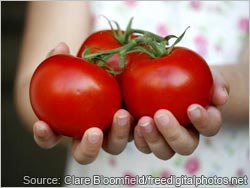
Cooking with your children is not only fun, it teaches
them valuable skills and can
encourage healthy eating. Plus, kids love learning to
cook-it's hands-on, messy and makes them feel like little adults! While you may
be a little apprehensive about tying an apron on your little one and getting in
the kitchen, there are many ways to ensure you enjoy a safe and productive
cooking lesson!
Benefits of cooking with kids:
- You'll have quality time. Cooking with your kids is a great
way to bond and spend time together, no matter their ages. Little ones will be
excited to join you with adult tasks. Teens may be resistant at first, but
telling your rebellious adolescent you're teaching her to be independent may
bring you closer!
- It's a useful skill. Many people reach adulthood without
having the slightest clue what to do in the kitchen besides push buttons on a
microwave. Getting your children familiar with cooking at a young age will help
them be self-sufficient as they get older-rather than relying on frozen meals
and takeout when they move out!
- They'll learn healthy habits. Preparing nutritious meals
with your children using healthy ingredients will help them make wise diet
choices as they grow up. If they take an interest in preparing healthy foods,
they will be more likely to maintain a well-balanced diet as adults.
Tips for cooking with kids
- Plan ahead. Have a recipe in mind, all the necessary
ingredients and tools laid out, and a game plan before you begin cooking. With
which tasks will your child assist you? What recipe is a good choice for
teaching basic cooking skills? It should be rather simple, involving steps your
child will be able to perform easily.
- Expect a mess. Cooking with a child will not be a tidy
affair. Expect spills and sloppy chaos as your child mixes, pours, and measures.
You can lay down plastic or cloth to cover the floor for some damage-control,
but never enter into a cooking lesson with your child without ensuring there's
plenty of time for clean-up later!
- Assign age-appropriate tasks. Of course, your child will
not be able to aid you in every aspect of cooking. Any steps that require skill
or precision (or are unsafe, of course), handle on your own, and allow your
child to pitch in for the simple tasks, such as mixing ingredients in a bowl.
Inflate these tasks' importance to keep your child occupied and prevent her from
constantly offering her help with the adults-only steps-like chopping or frying.
- Explain each step. As you prepare your dish, talk about
each step and explain to your child how it's done-even if it's not a task he can
do on his own. This way he can still learn without actually putting his hands
too close to the oven or sharp knives. If your child is a little older, you can
have him read out the steps and ingredient measurements to you as you go along.
 Taste testing. Sampling is always the most fun
part of cooking! Letting your child taste the foods as you prepare them will
introduce them to new flavors, teach them how the dish should develop, and help
them learn which foods are safe to eat raw and when. Reinforce the rule of
always using a clean spoon to steal a taste-never fingers or utensils used for
cooking.
Taste testing. Sampling is always the most fun
part of cooking! Letting your child taste the foods as you prepare them will
introduce them to new flavors, teach them how the dish should develop, and help
them learn which foods are safe to eat raw and when. Reinforce the rule of
always using a clean spoon to steal a taste-never fingers or utensils used for
cooking.
- Remember hygiene and safety. Cooking with your child is a
great way to teach her about being safe in the kitchen. Tell her about the
dangers of cross-contamination, and to always sanitize any utensils or surfaces
that come in contact with raw meat, poultry and fish. Demonstrate the proper way
to hold knives and other sharp cooking tools, and how to be mindful of open
flames and hot surfaces while cooking. Illustrate the importance of oven mitts
and pot holders to prevent burns, or wearing an apron to protect against hot oil
splatters.
- Have fun! Make the experience enjoyable and exciting for
your child. Try not to be tense, and resist the urge to be overly critical or
bossy. It's a learning process-the more relaxed and laidback you remain, the
more fun your child will have, and the more beneficial cooking skills he will
learn!